
Hoopla and Hubris: Why Indian startups are coming undone
The low tide of funding has exposed the ugly underbelly of the startup ecosystem in India—financial irregularities, forensic auditing, glaring absence of corporate governance, acts of omission and commission. Is there a way to fix the system?
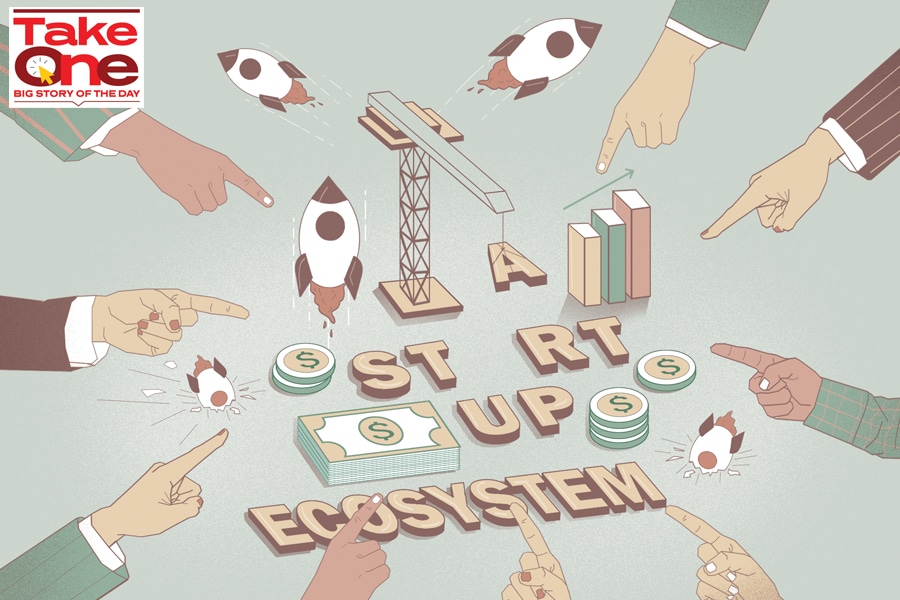 The Indian startup ecosystem has been rocked by a series of alleged financial irregularities.
Illustration: Chaitanya Dinesh Surpur
The Indian startup ecosystem has been rocked by a series of alleged financial irregularities.
Illustration: Chaitanya Dinesh Surpur
January 2023, Gurugram. “Tell me the difference between magic and trick,” the ‘magician’ starts the off-the-record interview by popping this question to the writer. It’s 7.30 pm, it’s pitch dark at Sector 62 in Gurugram, and the gusty chilly winds on Monday evening have made the bitter winter unbearable. “First, I will tell you what magic is,” says the second-time-founder who was dubbed magician during the prime of his maiden venture.
The 34-year-old takes us to 2014. The engineer from one of the top colleges co-founded a ‘consumer’ startup—he doesn’t want to disclose either the name of the segment or the venture—which had the potential to be disruptive and change the dynamics of the consumer market. A premium school background, a promising service and an impressive storytelling…the rookie founder tapped into his alum network, and quickly found backers, angels as well as institutional investors.
Being quick as a bunny in getting funded, though, was not magical. “That was the curtainraiser. The magic show had not yet started,” says the founder who starts to reconstruct a sequence of events from his ‘not-so forgettable past’.
The cafeteria in Gurugram suddenly sees heavy footfall, soft music in the background gets lost in the loud chatter, and both of us step outside to resume the conversation.An empty bench, an inconspicuous tiny park and a muted surrounding were all that were needed to slip into the past. “It was getting loud inside my head,” recalls the founder, alluding to the first year of his venture, a heady pace of growth, and an erroneous sense of confidence. “It was much more than over-confidence,” he clarifies. “And you can’t blame me. Every little or big thing inflated my confidence,” he adds. Brisk funding, deceptive consumer love on the back of hefty discounts, aggressive expansion, an ever-swelling team, a flashy lifestyle and a massive scale built by burning cash at an insane rate…the entrepreneur could not have wished for a better start. “All these were intoxicating and magical,” he recalls.
Now the magic show started. The VCs egged the founding team to burn cash, dole out discounts, and play the land grab game. “You have to be the biggest in your segment,” was the clear directive. “Don’t worry about funding,” promised one of the VCs. “Just remember, you need to fail fast and move on,” is what another ‘founder-friendly’ VC counselled. The founder’s ambitions got stoked.



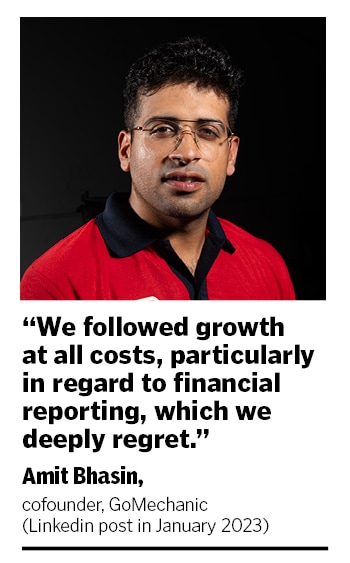 Meanwhile, the backers stayed true to their promise. More funders joined the show, the venture kept aggressively fanning out, and the topline grew furiously. “This was magic,” he says, adding that the progress was surreal. “My board started calling me magician,” he recalls. There was a perfect product-market fit, revenues soared, valuation jumped, and the founder started flirting with the idea of listing the company after three-four years. “Do you know how a magician pulls a rabbit out of a hat,” he asks. “It happens due to sleight of hand and misdirection.”
Meanwhile, the backers stayed true to their promise. More funders joined the show, the venture kept aggressively fanning out, and the topline grew furiously. “This was magic,” he says, adding that the progress was surreal. “My board started calling me magician,” he recalls. There was a perfect product-market fit, revenues soared, valuation jumped, and the founder started flirting with the idea of listing the company after three-four years. “Do you know how a magician pulls a rabbit out of a hat,” he asks. “It happens due to sleight of hand and misdirection.” 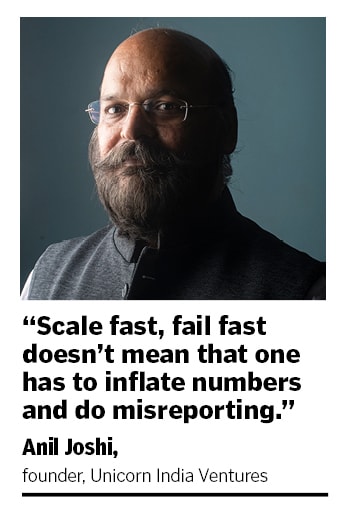 Fast forward to 2023. The Indian startup ecosystem has been rocked by a series of alleged financial irregularities. It started with GoMechanic in January. Amit Bhasin, one of the co-founders, confessed to grave errors in judgement in financial reporting. In a LinkedIn post on January 17, he outlined the stark reality faced by founders. “As entrepreneurs, we identify problems, come up with solutions, and explore every opportunity to grow those solutions to meet unmet needs. But in this instance, we got carried away," he wrote. "Our passion to survive the intrinsic challenges of this sector and manage capital took the better of us and we made grave errors in judgment. We followed growth at all costs, particularly in regard to financial reporting, which we deeply regret."
Fast forward to 2023. The Indian startup ecosystem has been rocked by a series of alleged financial irregularities. It started with GoMechanic in January. Amit Bhasin, one of the co-founders, confessed to grave errors in judgement in financial reporting. In a LinkedIn post on January 17, he outlined the stark reality faced by founders. “As entrepreneurs, we identify problems, come up with solutions, and explore every opportunity to grow those solutions to meet unmet needs. But in this instance, we got carried away," he wrote. "Our passion to survive the intrinsic challenges of this sector and manage capital took the better of us and we made grave errors in judgment. We followed growth at all costs, particularly in regard to financial reporting, which we deeply regret." 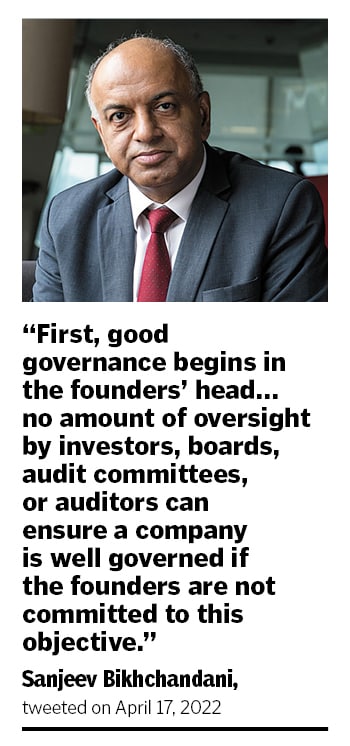 Meanwhile, a few weeks down the line, another case of alleged financial irregularity popped up. This time it is healthcare startup Mojocare, which was founded in May 2021, raised $20 million in Series A funding, and counted B Capital, Chiratae Ventures, Better Capital, and Peak XV (formerly Surge, Sequoia Capital India’s accelerator programme), among its backers. In a media statement, the backers pointed out that major investors of Mojocare initiated a review of the company's financial statements. “Initial findings have uncovered financial irregularities, and it has become apparent that the business model is not sustainable due to a variety of operational and market factors," the backers reportedly said in a statement released in the third week of June.
Meanwhile, a few weeks down the line, another case of alleged financial irregularity popped up. This time it is healthcare startup Mojocare, which was founded in May 2021, raised $20 million in Series A funding, and counted B Capital, Chiratae Ventures, Better Capital, and Peak XV (formerly Surge, Sequoia Capital India’s accelerator programme), among its backers. In a media statement, the backers pointed out that major investors of Mojocare initiated a review of the company's financial statements. “Initial findings have uncovered financial irregularities, and it has become apparent that the business model is not sustainable due to a variety of operational and market factors," the backers reportedly said in a statement released in the third week of June. 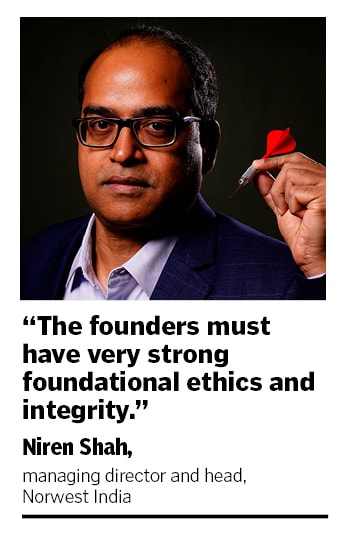 Kushal Karwa, one of the co-founders, went ballistic in baring his unbridled ambitions. “The goal to become the largest end-to-end player in the vehicle maintenance and repair space in India is very ambitious,” he stressed in the press note. The money raised, he continued, would be used to continue aggressive geographical expansion and investment in innovation to keep the startup ahead of the curve. In 2017, GoMechanic raised money from Orios Venture Partners, Kunal Bahl and Rohit Bansal.
Kushal Karwa, one of the co-founders, went ballistic in baring his unbridled ambitions. “The goal to become the largest end-to-end player in the vehicle maintenance and repair space in India is very ambitious,” he stressed in the press note. The money raised, he continued, would be used to continue aggressive geographical expansion and investment in innovation to keep the startup ahead of the curve. In 2017, GoMechanic raised money from Orios Venture Partners, Kunal Bahl and Rohit Bansal. 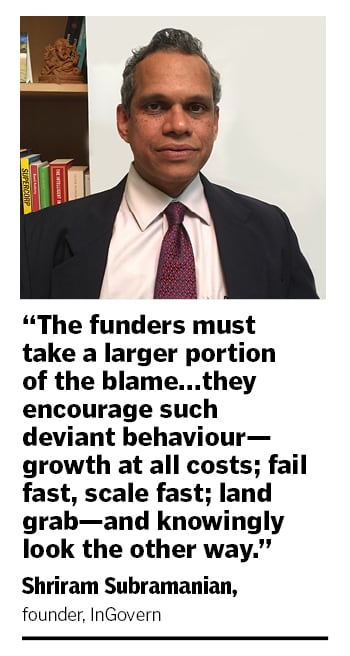 Now, let’s jump to June 2021. GoMechanic reportedly closed FY21 at Rs 34 crore. In June, the startup raised $42 million in Series C funding led by Tiger Global Management. Existing investors such as Sequoia Capital India, Orios Venture Partners and Chiratae Ventures too participated in the round. To the backers, the performance of the company was still fascinating despite the loss of Rs27 crore in FY21. But why would anybody look at losses when there was a brighter picture to focus on? The company had a revenue of Rs57 lakh in FY17, raised an undisclosed amount from Hero Motocorp’s Pawan Munjal, and galloped to Rs34 crore in four years.
Now, let’s jump to June 2021. GoMechanic reportedly closed FY21 at Rs 34 crore. In June, the startup raised $42 million in Series C funding led by Tiger Global Management. Existing investors such as Sequoia Capital India, Orios Venture Partners and Chiratae Ventures too participated in the round. To the backers, the performance of the company was still fascinating despite the loss of Rs27 crore in FY21. But why would anybody look at losses when there was a brighter picture to focus on? The company had a revenue of Rs57 lakh in FY17, raised an undisclosed amount from Hero Motocorp’s Pawan Munjal, and galloped to Rs34 crore in four years. 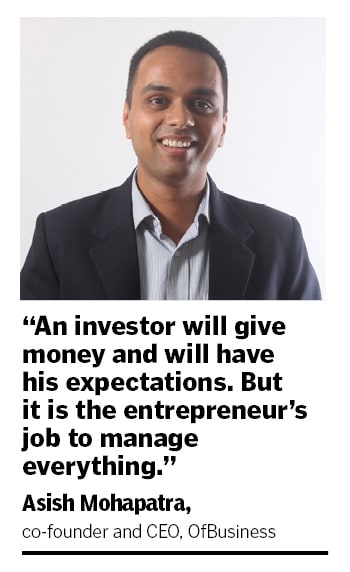 Agrees Asish Mohapatra the co-founder and CEO of OfBusiness. “The values can’t be compromised,” says the VC-turned-entrepreneur. “The values have to be inbuilt in a founder. If they go missing, I don’t know what to say.”
Agrees Asish Mohapatra the co-founder and CEO of OfBusiness. “The values can’t be compromised,” says the VC-turned-entrepreneur. “The values have to be inbuilt in a founder. If they go missing, I don’t know what to say.” 



